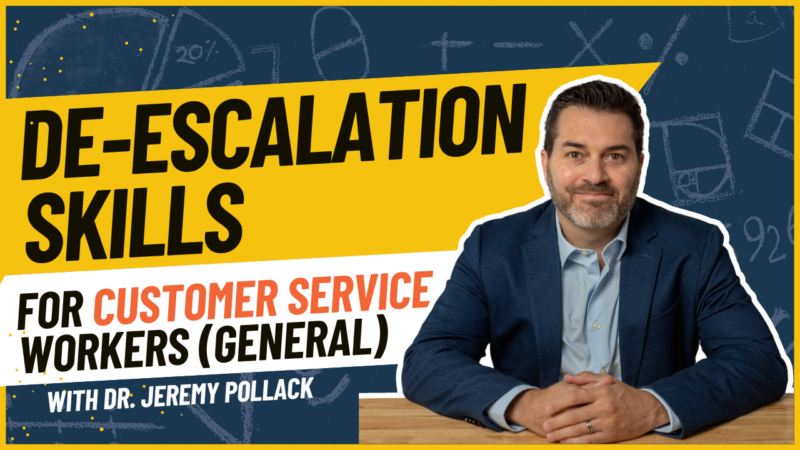Table of content
In today’s fast-paced work industries, having the ability to manage and defuse conflicts stands out as a critical asset to hiring managers. Business leaders and hiring managers recognize and desire de-escalation skills when they look at potential hires’ resumes.
Adding these skills to their companies helps integrate techniques to enhance and maintain a collaborative and efficient workplace. However, you might be wondering how to best highlight your de-escalation skills in your resume and job interviews to ensure you’re communicating your capacity to handle and resolve workplace conflicts.
Understanding the Role of De-escalation Skills in the Workplace
De-escalation skills are essential for navigating conflicts and maintaining peace in professional settings. These skills involve calming tense situations, understanding diverse perspectives, and finding amicable solutions without escalating the problem. Business leaders are looking for new and effective ways to add these skills to their companies.
Benefits of Including De-escalation Skills on Your Resume
Incorporating de-escalation skills into your resume’s skill section does more than just fill space—it showcases your proactive approach to preventing and solving problems. These skills are particularly attractive in industries where customer service, client interaction, and team collaboration are pivotal. They tell prospective employers through bullet points in your skills section that you can turn potential conflicts into constructive conversations, ultimately boosting customer satisfaction and team cohesion.
How to Convey Your De-Escalation Skills on Your Resume
It’s great to be trained in de-escalation skills, but to stand out in the job market, you need to showcase them effectively on your resume. Here’s how you can articulate these essential skills so that hiring managers recognize your ability to manage and resolve conflicts professionally.
Key De-escalation Techniques and Strategies
When detailing your de-escalation techniques on your resume, make sure you focus on how you’ve employed active listening through the HEARD method, good communication skills for customer service, and neutral language to manage disputes effectively. For example, you can write:
“In a high-stress customer service role at Company XYZ, I utilized calm communication and active listening to de-escalate a critical situation with a dissatisfied client who was considering a competitor’s offer. I utilized my HEARD training to address their concern, while remaining composed, to retain the client and even secure an upsell. Ultimately, this improved customer satisfaction and loyalty.”
Using this scenario allows you to highlight your strategic use of de-escalation techniques and demonstrate your ability to transform very tense situations into positive outcomes.
Internal Conflict Resolution and Active Listening Skills
Demonstrating your conflict resolution and active listening skills can significantly impact your resume’s effectiveness. Consider including a scenario like this:
“While working on a project team at Company XYZ, I started to notice rising tensions that were resulting from miscommunication. I initiated a mediation session where I actively listened to all parties and facilitated a dialogue that clarified misunderstandings. This intervention resulted in restored team cohesion and a 20% increase in the efficiency of our project delivery.”
This section shows your proactive approach to resolving conflict and your ability to listen empathetically. These skills are both highly valued across various industries.
Emotional Intelligence
Emotional intelligence is another key component of effective de-escalation skills. Highlight instances where your emotional intelligence played a big role in managing workplace dynamics. For example:
“During a period of organizational change at Company XYZ, I observed significant resistance from the team. Recognizing the emotional issues escalating, I led a series of team engagement sessions to allow for an open discussion, using my emotional intelligence to acknowledge fears while guiding the team toward embracing change. My efforts led to a smoother transition with a 75% reduction in turnover.”
This example showcases your emotional intelligence while also connecting it with tangible business outcomes. This quantitative reference makes it clear why these skills are essential for leadership roles.
Including De-Escalation Skills in Resumes for Specific Areas
When crafting your resume, aligning your de-escalation skills with the specific requirements in the job description for the role you are applying for can help boost your appeal to hiring managers. Here’s how you can illustrate these hard and soft skills across various sectors:
Customer Service
On your resume, mention how your de-escalation skills and communication skills specifically for sales representatives led to resolving customer complaints and enhanced customer loyalty. This helps them connect your conflict resolution skills with an improved bottom line. For example: “In a challenging customer service role at Company XYZ, I successfully de-escalated a critical situation with a client who was upset by employing active listening and empathy, resulting in retaining the client and securing a renewal contract, which boosted customer retention by 15%.”
This example demonstrates your practical application of de-escalation training for customer service with real-world customer calls or customer inquiries.
Healthcare
In the healthcare sector, de-escalation skills are extremely important for both patient care and staff interaction. You could state: “Utilized de-escalation techniques to manage a high-stress incident involving a distressed patient at Medical Facility XYZ, which calmed the patient and facilitated a safe treatment process, enhancing patient care and staff collaboration.”
This points to your capacity to handle sensitive situations, ensuring patient safety and staff welfare.
Law Enforcement and Security
For roles in law enforcement and security, find ways to demonstrate your ability to maintain peace and public safety since that is one of the most important aspects of the job. An example might be: “Applied advanced de-escalation strategies during a security breach at My City Police Department to resolve the situation without physical confrontation while maintaining public safety and preventing potential harm.”
Education
In education, de-escalation can transform classroom management, which is something many teachers struggle with in their school setting. Consider adding: “Implemented de-escalation methods to address behavioral issues in a classroom setting at School XYZ to foster a more inclusive and productive learning environment for all students.”
Food/Hospitality
In the hospitality sector, the quick resolution of service issues is key, especially when it comes to gaining repeat customers. Include an example like: “Resolved multiple escalated customer service issues at Hotel XYZ, ensuring guest satisfaction and maintaining a high standard of service during peak hours.”
This reflects your proficiency in handling potentially volatile customer interactions smoothly and professionally.

Managers and Social Workers
For managerial or social work roles, emphasize the broader impact of your de-escalation skills: “Led a team intervention that utilized de-escalation techniques to resolve interpersonal conflicts at Agency XYZ, improving team effectiveness and enhancing client service delivery.”
This example underlines your leadership capabilities and your strategic use of de-escalation to foster a cooperative work environment.
By clearly illustrating how your de-escalation skills apply to your specific sectors, you can effectively communicate to a potential employer that you have both the soft skills and hard skills you need to excel in the job you’re applying for. This tailored approach highlights your qualifications beyond technical skills but also demonstrates your understanding of the unique challenges and needs of the role you aspire to secure.
How to Prepare for Discussing De-Escalation in Your Interview
With your resume effectively communicating your ability to help the company with internal conflicts and external hostilities, you will need to reinforce these abilities during the interview phase. When you’re getting ready for your interview, start thinking of more concrete examples that demonstrate your de-escalation skills and how they enhance your technical knowledge. Make sure they aren’t the same as the ones you included in your resume so you don’t end up giving a resume summary of how you solve problems. Potential employers want to hear a variety of examples to reinforce how valuable your conflict resolution skills will be to the organization. Practice articulating these scenarios clearly, focusing on the problem, your action, and the result. Be ready to discuss the techniques you used, the outcomes, and what you learned from the experience.
Do’s for Discussing De-Escalation in Interviews:
- Prepare Concrete Examples: Before the interview, reflect on past experiences where your de-escalation skills made a positive impact. For example, you might say, “At my previous job, I was faced with a heated disagreement between two team members. I intervened by listening to each side, facilitated a dialogue that acknowledged all customer concerns, and guided them toward a mutual understanding, which improved our team’s collaboration.”
- Focus on Techniques and Outcomes: Clearly communicate the techniques you used. Link these techniques to positive outcomes like how you resolved customer complaints, enhanced team dynamics, or increased customer satisfaction.
- Highlight Learning Experiences: Discuss what you learned from each experience. This shows your commitment to personal and professional growth. You might say, “This experience taught me the importance of empathy in leadership and how recognizing emotions can de-escalate potential conflicts before they escalate.”
Don’ts for Discussing De-Escalation in Interviews:
- Avoid Generalizations: Don’t just state that you have great de-escalation skills. Avoid vague statements and instead provide detailed examples that demonstrate these skills in action.
- Don’t Focus Solely on Negative Aspects: Describe the conflict to set the context, but make sure you’re focusing more on the resolution and the skills you applied than the conflict itself.
- Don’t Underplay Your Role: While humility is good in your daily life, your interview is your opportunity to shine. Clearly articulate the role you played in achieving resolutions. Make sure the interviewer understands your direct involvement and leadership in de-escalation.
Boost Your Resume and Career: Master De-Escalation Skills with Defuse Training
As you prepare to advance your career, consider the edge that our de-escalation training can offer. No matter what industry you work in, mastering the art of conflict resolution is an important part of success. Defuse’s specialized training programs are designed to give you the tools necessary to handle workplace conflicts effectively, enhancing your professional interactions while elevating your resume. These skills are desirable since they are often required in today’s diverse and dynamic workplaces.
Reach out to us or check out our asynchronous course options to find out how our training can transform challenges into opportunities for growth, setting you apart from the competition.




